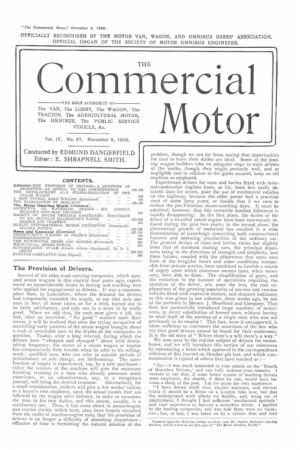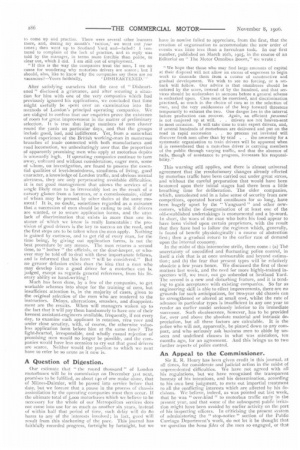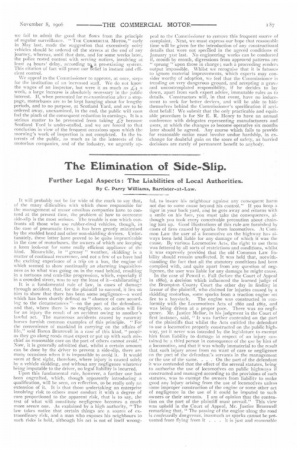The Provision of Drivers.
Page 1

Page 2

Page 3

If you've noticed an error in this article please click here to report it so we can fix it.
Several of the older road-carrying companies, which operated steam wagons in this country four years ago, experienced no inconsiderable losses in testing and teaching men who applied for engagement as drivers. It was a commonplace then, in Lancashire, where the demand for drivers had temporarily exceeded the supply, to say that only one man in four, of those taken on for a trial, turned out to be fairly satisfactory, and only one in a score to be really good. When we add that, for each man given a job, six had, after an interview, "No good" marked upon their forms, it will be realised that even the trying occupation of controlling early patterns of the steam wagon brought about a rush of unsuitable men to the depots of the companies in question. To-day, after a long interval, during which the drivers have "chopped and changed " about with diminishing frequency, the owner of a steam wagon or tractor has comparatively little trouble when he adds to his rollingstock : qualified men, who can refer to suitable periods of probationary or sole charge, are forthcoming. The same freedom of supply is experienced, too, by a new purchaser : either the vendors of the machine will give the necessary finishing training to a man who already possesses some experience, or an advertisement, say, in a recognised journal, will bring the desired response. Alternatively, for a small consideration, makers will give a few weeks' tuition to a buyer's own employee, upon the actual rounds that are followed by the wagon after delivery, in order to accustom the man to his new duties, and this course, usually, is a satisfactory one. Thus, it has come about in steam-wagon and tractor circles, which have, also, been largely recruited from the ranks of traction-engine men, that the provision of drivers is no longer a difficulty of absorbing importance : effluxion of time is furnishing the natural solution of the
problem, though we are far from saying that opportunities for men to learn their duties are ideal. Some of the leading wagon builders take no adequate steps to train drivers at the works, though they might perfectly well, and at negligible cost in relation to the gains secured, keep an old machine so employed.
Experienced drivers for vans and lorries fitted with internal-combustion engines have, so far, been less easily obtained than for steam, quae the use of mechanical vehicles on the highway, because the older power had a practical start of some forty years, or double that if we care to reckon the pre-Victorian steam-coaching days. It must be admitted, however, that this erstwhile marked difference is rapidly disappearing. In the first place, the duties of the driver of a so-called petrol engine have been enormously reduced during the past two years; in the second place, the phenomenal growth of motorism has resulted in a wide dissemination of knowledge concerning both constructional features and operating peculiarities of the ordinary car. The general design of vans and lorries varies but slightly front that of standard touring cars, the principal departures being in the directions of strength and simplicity, and these factors, coupled with the abhorrence that some men have of the irregular hours and other conditions inseparable from private service, have combined to furnish a source of supply upon which motorvan owners have, when necessary, been able to draw. The simplification of parts, and the reduction in the number of operations requiring the attention of the driver, are, none the less, the root explanations of the growing popularity of one-ton and two-ton vehicles fitted with explosion motors, and eloquent testimony to this was given in our columns, three weeks ago, by one of the partners in Messrs. J. Shoolbred and Company. That firm has successfully introduced large numbers of motorvans, in direct substitution of horsed vans, without having to avail itself of the services of a single man who was not previously in its employ! This fact, were it unsupported, is alone sufficient to controvert the assertions of the few who say that good drivers cannot be found for their motorvans. It is the old story of' Where there's a will there's a way." We now pass to the red-hot subject of drivers for motorbuses, and we will introduce this section of our references by reproducing a letter which appeared in the correspondence columns of this journal on October 4th last, and which communication is typical of others that have reached us :—
" Sir was much interested in your article on the 'Dearth of Motorbus Drivers,' and can fully endorse your remarks. I venture to say that, if some better system of teaching drivers were employed, the dearth, if there be one, would soon become a thing of the past. Let me quote my own experience.
"I have driven small cars, electric tramcars, and electric trains (I should be a driver on a London tube now, but that the underground work affects my health), and, being out of employment, I thought I had sufficient 'mechanical aptitude' and road experience to become a motorbus driver. I applied to the leading companies, and was told there were no vacancies; but, at last, I was taken on by a certain firm and told to come up and practise. There were several other learners there, and, during my month's 'tuition, we went out lour times ; then went up to Scotland Yard and—failed ! I ventured to complain of the lack of practice, and in reply was told by the manager, in terms inure forcible than polite, to clear out, which I did. I am still out of employment. "If this is the way the companies treat the men, I see no cause for wondering why motorbus drivers are scarce ; but I should, also, like to know why the companies say there are no vacancies?--Yours faithfully, 'DISHEARTENED.' "
After satisfying ourselves that the case of " Disheartened " disclosed a grievance, and after securing a situation for him with one of the very companies which had previously ignored his applications, we concluded that time might usefully be spent over an examination into the methods of London's principal operating companies. We are obliged to confess that our enquiries prove the existence of room for great improvement in the matter of preliminary selection. It is true that large numbers of men cluster round the yards on particular days, and that the groups include good, bad, and indifferent. Yet, from a somewhal varied experience of the British working-man in numerous branches of trade connected with both manufactures and road locomotion, we unhesitatingly aver that the proportion of apparently promising men who apply at motorbus depots is unusually high. If operating companies continue to turn away, unheard and without consideration, eager men, some of ■v born, on investigation, are found to possess the essential qualities of level-headedness, steadiness of living, good character, a knowledge of London traffic, and obvious mental alertness, they are only perpetuating avoidable difficulties. It is not good management that allows the services of a single likely man to be irrevocably lost as the result of a cursory glance from a foreman, or a commissionaire, either of whom may be pressed be other duties at the same moment I It is, no doubt, sometimes regarded as a nuisance that a succession of men should be calling to ask if drivers are wanted, or to secure application forms, and the uttei lack of discrimination that exists in more than one instance of which we know is really lamentable ; the provision of good drivers is the key to success on the road, and the first steps are to be taken when the men apply. Nothing is gained by curtness, and to get rid of every mun, for the time being, by giving out application forms, is not the best procedure by any means. The man returns a second time, to " bother " the officials, or the door-keeper, or whoever may be told off to deal with these importunate fellows, and is informed that his form " will be considered." But no greater delusion exists than the idea that a man who may develop into a good driver for a motorbus can be judged, except as regards general references, from his literary ability or hand-writing ! Much has been done, by a few of the companies, to get workable schemes into shape for the training of inen, but insufficient attention is, in the majority of cases, given to the original selection of the men who are tendered to the instructors, Delays, altercations, smashes, and disappoint ment are the results. When will managers waken up to the fact that it will pay them handsomely to have one of their
keenest assistant-engineers available, frequently, if not every day, to examine each applicant in rotation, viva voce and under close scrutiny, with, of course, the otherwise value less application form before him at the same time? The light-hearted, irresponsible, and wholly casual rejection of promising mon would no longer be possible, and the coin
parties would have less occasion to cry out that good drivers are scarce. Neither would the position to which we next have to refer be so acute as it now is.
A Question of Digestion.
Our es tim a to that '' the round thousand " of London motorbuses will be in commission on December 3ist next, promises to be fulfilled, as about 140 of one make alone, that of Milnes-Daimler, will be passed into service before that date, but we foresee that a pause in the process of chassis assimilation by the operating companies must then occur. If the ultimate total of 5,000 motorbuses which we believe to be necessary for the whole of our Metropolitan services does not come into use for as much as another six years, instead of within half that period of time, such delay will do no harm_ to any of the interests involved; in fact, good will result from this slackening of the pace. This journal has faithfully recorded progress, fortnight by fortnight, but we have in nowise failed to appreciate, from the. first, that the creation of organisation to accommodate the new order of events was little less than a herculean task. In our first number, published on March t6th, 1935, in the course of an Editorial on " The Motor Omnibus Boom," we wrote : " We hope that those who may find large amounts of capital at their disposal will not allow an excess of eagerness to begin work to dissuade them from a course of constructive and gradual development. We wish to see no forcing, or a setback will follow. Our advice is that omnibuses should be ordered by the score, instead of by the hundred, and that services should be undertaken in sections before a general scheme is embarked upon. Care most be exercised, and discrimination practised, as much in the choice of cars as in the selection of men, and the very suddenness of the leap forward threatens temporarily to exhaust the two. One danger lies in the interval before production can recover. Again, an efficient personnel is not conjured up at will. . . drivers are not heaven-sent to meet occasion. It will take time to train expert drivers, and, if several hundreds of motorbuses are delivered and put on the road in rapid succession . . no process yet invented will discover fresh men other than by trial . . the necessity for a systematic organisation to train drivers will be apparent when it is remembered that a motorbus driver is carrying members of the public through varying traffic, and that the absence of rails, though of assistance to progress, increases his responsibility."
This warning still applies, and there is almost universal agreement that the revolutionary changes already effected by motorbus traffic have been carried out under great stress, and without the careful preparation that would have been bestowed upon their initial stages had there been a little breathing time for deliberation. The older companies, which, unmolested and in a false sense of security from new competitors, operated horsed omnibuses for so long, have been hugely upset by the " Vanguard " and other newcomers, whilst the disorganisation of at least one of the old-established undertakings is monumental and a by-word. In short, the woes of the man who bolts his food appear to have been visited upon certain proprietors, with the result that they have had to follow the regimen which, generally, is found of benefit physiologically a course of abstention first ; then a gradual return to the earlier rate of demand upon the internal economy. In the midst of this internecine strife, there come : (a) The uncertainty of uncodified and fluctuating police control, in itself a risk that is at once uninsurable and beyond estimation ; and (b) the fear that present types will be relatively obsolete a few years hence. We discussed the first of the matters last week, and the need for more highly-trained inspectors will, we trust, not go unheeded at Scotland Yard. The second is a new and disturbing feature, and it is tending to gain acceptance with existing companies. So far as engineering skill is able to effect improvements, there are no grounds for such anticipations, for two-year old chassis can be strengthened or altered at small cost, whilst the rate of advance in particular types is insufficient in any one year to render an earlier model seriously inferior to its immediate successor. Such obsolescence, however, has to be provided for, over and above the absolute material and intrinsic depreciation, but all these factors are calculable. It is the police who will not, apparently, be pinned down to any compact, and who seriously ask business men to abide by unseen and undefined clauses in what was mistaken, ten months ago, for an agreement. And this brings us to two further aspects of police control.
An Appeal to the Commissioner.
Sir E. R. Henry has been given credit in this journal, at all times, for considerate and judicial action in the midst of unprecedented difficulties. We have not agreed with all his regulations, but we have recognised the transparent honesty of his intentions, and his determination, according to his own best judgment, to mete out impartial treatment to all the conflicting interests which are affected by his decisions. We believe, indeed, as was pointed out last week, that he was " over-kind " to motorbus traffic early in the present year, and that some of the subsequent public irritation might have been avoided by earlier activity on the part of his inspecting officers. In criticising the present system of administering the " stop-notice " section of the Public Carriage Department's work, do not let it be thought that we question the bona fides of the men so engaged, or that we fail to admit the good that flows from the principle of regular surveillance. " THE COMMERCIAL Mut-0R," early in May last, made the suggestion that excessively noisy vehicles should be ordered off the streets at the end of any journey, whereas, until that date, and for some weeks later, the police rested content with serving notices, involving at least 24 hours' delay, aceording tla pre-existing. system. This citation of fact will prove our ffelief in instant and efficient control.
We appeal to the Commissioner to approve, at once, steps For the institution of an increased staff. We do not know the wages of an inspector, but were it as much as ;64 e week, a large increase is absolutely necessary in the public interest, if when presented for re-examination after a stoppage, motorbuses are to be kept hanging about for lengthy periods, and to no purpose, at Scotland Yard, and are to be ordered away, unexamined, in the end, the public will soon feel the pinch of the consequent reduction in earnings. It is a serious matter to be prevented from taking -./;7 because Scotland Yard is under-staffed, and we are forced to that eonclusion in view of the frequent occasions upon which the morning's work of inspection is not completed. In the interests of the public, as much as in the interests of the motorbus companies, and of the industry, we urgently ap peal to the Commissioner to remove this frequent source of complaint. Next, we must express our hope that reasonable time will he given for the introduction of any constructional details that were not specified in the agreed conditions of January 3 it last. No engineering works can be conducted if, month by month, digressions from approved patterns are " sprung " upon those in charge; such a proceeding renders output impossible. Whilst we recognise that it is fatuous 0) ignore material improvements, which experts may conskier worthy of adoption, we feel that the Commissioner is treading on very dangerous ground, and accepting a grave and uncontemplated responsibility, if he decides to lay. down, apart from such expert advice, immutable rules as to details. Constructors will, in that event, have no inducement to seek for better devices, and will be able to hide themselves behind the Commissioner's specification if accident befall! We submit that the only practicable and equitable procedure is for Sir E. R. Henry to have an annual conference with delegates representing manufacturers and users, at which the changes to become operative six months later should be agreed. Any course which fails to provide for reasonable notice must involve undue hardship, in exchange for doubtful gain on the score of safety, as hurried decisions are rarely of permanent benefit to anybody.
























